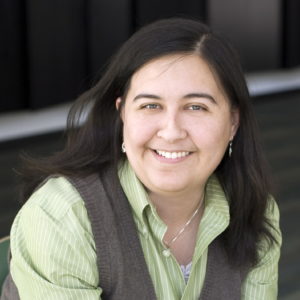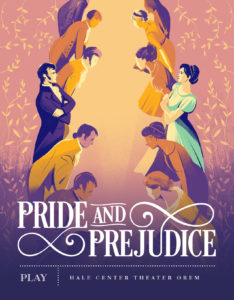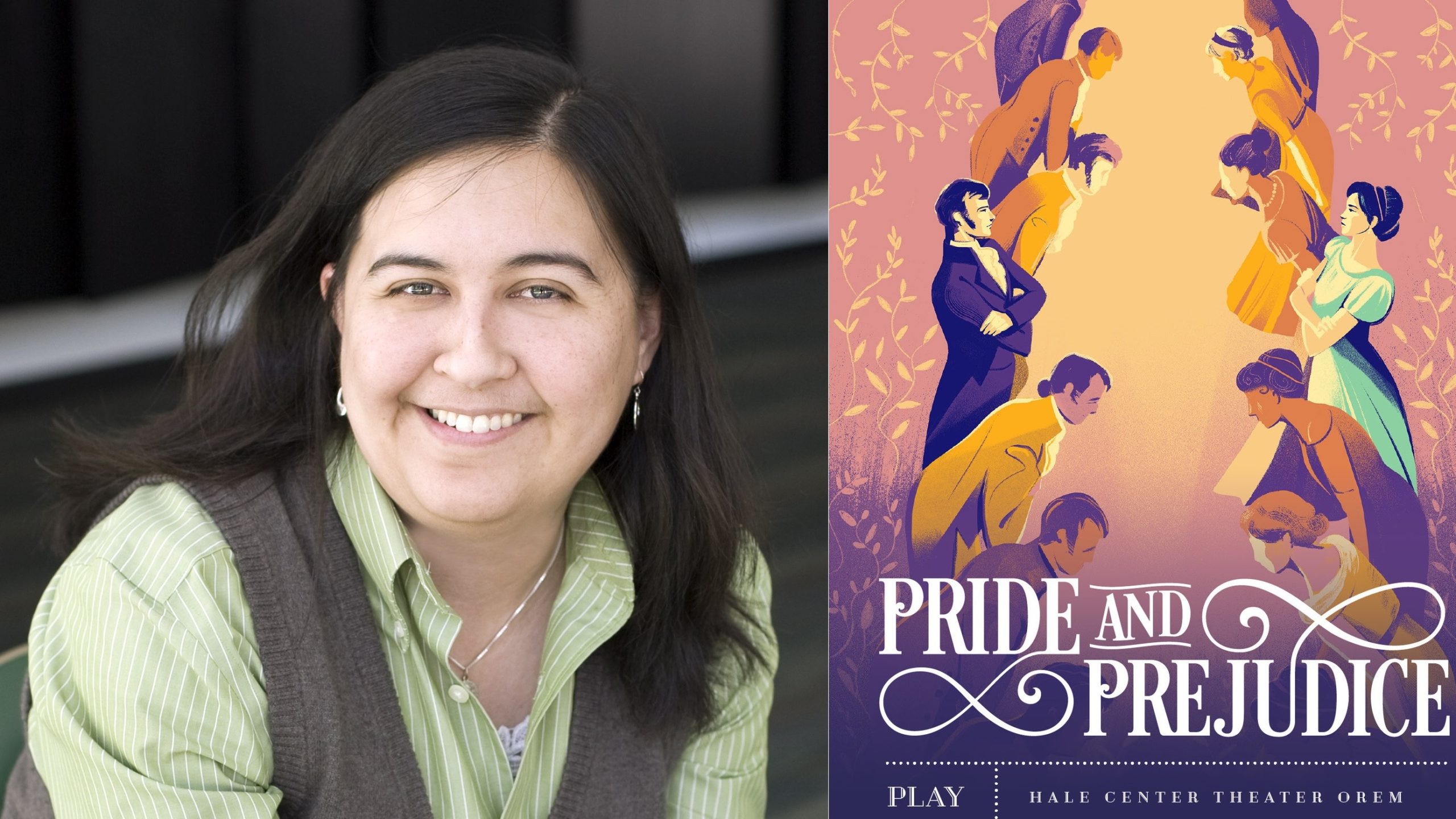OREM — The first production in 2023 from Hale Center Theater Orem is a new adaptation of Jane Austen‘s comedy Pride and Prejudice. One thing that makes this production special is that it is adapted for the stage by local playwright Melissa Leilani Larson. I had a chance to talk to Larson about her career and what it was like adapting a beloved classic by Jane Austen. The interview below has been lightly edited.
UTBA: How did you become a playwright? What inspired you to begin writing?

Larson: I think I’ve always known I was going to be a writer. Reading was my favorite thing when I was a kid. I’ve always been obsessed with story and storytelling. In grade school I decided I would write books, and that dream held firm through most of school. I started my undergrad at BYU with the intent of becoming a novelist. In my sophomore year, I saw a flyer advertising a playwriting contest. There was a $500 prize and I thought— I can write a play. I went home and did it; it took the better part of two weeks. I thought my play was great and I was shocked when I didn’t win (ha). So I signed up for a playwriting class in the theatre department the fall of my senior year. It was easily the hardest writing class I had taken up until that point, but it changed everything. I haven’t really looked back.
In the years since I’ve thrown myself into the theatre and learning how it works. I went to grad school and earned my MFA. This past year my 20th play was produced at Plan-B Theatre in Salt Lake, and some truly thrilling things are on the horizon. For starts, Pride and Prejudice will be produced at the Texas Shakespeare Festival this summer.
UTBA: You also have written screenplays. How is the process different for writing a play, versus a screenplay?
I think the goal of both is the same: to tell a great story as well as you can. But both forms offer different tools and advantages. Live theatre is immediate, and the actors are close to you; the audience becomes part of the show. Generally, live theatre is driven by dialogue, while film is all about visual imagery. That said, interesting visuals are vital in theatre, and the sparseness of dialogue in film makes it all the more important.
In either form, I’m thinking about what the audience needs to know, and when is best to give them that information. I think a lot about how I want the play or film to end, and how to drive the story in that direction. I’m thinking about characters, and what they want, and what they will risk to get it.
UTBA: Was it intimidating writing something as iconic as Pride and Prejudice?

Oh, yes. Definitely. I know so many people who love the book. Jane-ites tend to be very protective of Austen’s work— “protective” meaning they can be very picky about what they like and don’t like. They are a difficult audience to please. (I say this as a Jane devotee myself) And while all of Jane’s novels are popular, Pride and Prejudice is easily the most beloved. That can be terrifying thing to think about.
But I thought — “I love this book too. If I don’t adapt it, I will regret it.” So, I took a stab. Maybe I’m not the right person to say it, but I think Jane and I get along pretty well. Sure, there are a lot of adaptations and films already floating out there in the universe. But my point of view on the story is going to be different than someone else’s. What I have tried to do is be true to the text but also let the play be its own creation. So there is a lot of Jane in the play, but there is also a lot of me. The fun part is when people in the audience can’t tell the difference.
I want people who know and love the story to enjoy the play, but I don’t want to exclude people who haven’t. A play is a different beast than a novel, and you have the chance to introduce people to Jane’s work—people who may not have read the novel otherwise. Some of the best compliments I’ve received about this play were from people who told me they didn’t really like Austen but really enjoyed the show.
UTBA: Why do you think Pride and Prejudice has remained so popular for so long?
With Pride and Prejudice Jane Austen gave us the template for the classic romantic comedy. So many other stories and plays and films have been built on the foundation of this story. As a literary work, it’s incredibly well built. The structure of the novel is incredibly solid.
It’s a story that takes women and their problems seriously. Elizabeth and Jane are dealing with very real problems. There is an adage, “Write what you know.” I think Austen epitomizes that saying. She is giving us a window into her time and what it is to be a 19th century woman. And her characters ring so true. Even though it’s a different time, I see flashes of people that I know sprinkled throughout Austen’s work.
And wow, the book is really pretty funny.
UTBA: What do you think is special about Lizzy and Darcy as characters?
There is a lot of classic push and pull in Lizzy and Darcy. Both of them start out wanting to make their own decisions and in the end figure out that life is a weird mix of deciding and not deciding. I think Lizzy is a favorite character because she speaks her mind. She’s witty and clever and she stands up for herself. She isn’t the prettiest sister, and that is just fine. What I love about her, though, is that she does have flaws.
It was important to me for both Lizzy and Darcy to see their flaws and strive to overcome them. At the very top of the show Jane tells Elizabeth, “So many flaws for you to overcome.” It’s not Jane being judgmental, not at all. But it’s setting Lizzy up to go on a journey to become a better person.
Darcy, too, has his flaws. As I approached the process of writing the play, he wasn’t my favorite leading man. So I had to figure out how to change that. There had to be more to him than being handsome, wealthy, and aloof. There are a couple of times in the play that Darcy apologizes, and I’m really proud of those moments. I feel like he is a real human, a complete person worthy of all the adoration the character receives.
UTBA: How was it working with Hale Center Theater Orem (HCTO) to get this particular production up and running?
I’ve loved the process so much. I love being in rehearsal and seeing a play come to life. I don’t know whether having a playwright in the room is something that happens a lot at HCTO, but they have all been so open and welcoming. I hope the actors are used to having me around by now.
HCTO is a well oiled machine; everyone has their head down, constantly doing great work. The level of production that happens in such a small space is really impressive. Watching all the parts come together has been a thrill.
This show is my first experience with double-casting. It’s something the HCTO does so well. Everyone is telling the same story, but both casts are full of such talented actors bringing their own touches and takes to the characters. It would be worth it to see the show more than once to see all of the actors.
UTBA: What would be your pitch to get people to come out to this staging of Pride and Prejudice?
This show really does have it all—comedy, romance, and some truly beautiful hats. You don’t want to miss it.
[box]Pride and Prejudice plays nightly (except Sundays) at 7:30 PM and on select Saturdays at 12 PM and 4 PM, January 6 through February 11, at Hale Center Theater Orem (225 West 400 North, Orem). Tickets are $27-34. For more information, visit haletheater.org. The run is quickly selling out, and so make sure you get your tickets quickly.[/box]
